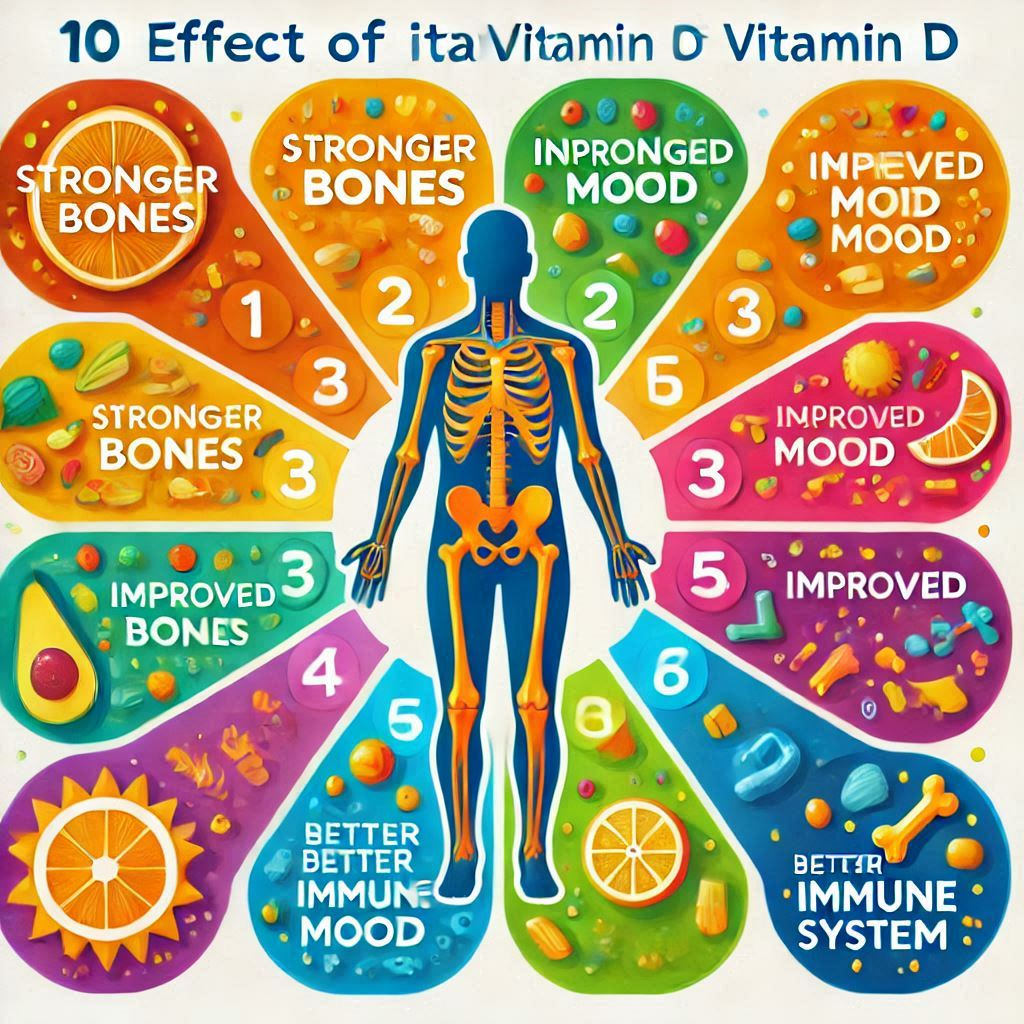
” 10 Essential Health Benefits of Vitamin A”
10 Essential Health Benefits of Vitamin A You Must Know
Discover 10 essential health benefits of Vitamin A for overall wellness and vitality. Unlock the secrets to better health today.


Introduction
Overview of Vitamin A and Its Significance for Overall Health
Vitamin A is a fat-soluble vitamin that is essential for maintaining overall health. It plays a crucial role in various bodily functions, including vision, immune system performance, skin health, and cellular communication. Vitamin A is found in two primary forms: preformed Vitamin A (retinol and retinyl esters) found in animal products, and provitamin A carotenoids (such as beta-carotene) found in plant-based foods.
Read also: 12 Alarming Signs of Vitamin B Deficiency You Should Know
Brief Explanation of the Importance of Vitamin A in the Diet
Incorporating Vitamin A into your diet is vital for ensuring that your body functions optimally. A deficiency in Vitamin A can lead to a range of health issues, including vision problems, weakened immune responses, and skin disorders. Consuming a balanced diet rich in Vitamin A can help prevent these issues and promote overall well-being.
Benefit 1: Enhances Vision
Explanation of How Vitamin A Supports Eye Health and Prevents Night Blindness
Vitamin A is essential for maintaining good vision. It is a critical component of rhodopsin, a protein in the eyes that allows you to see in low-light conditions. A deficiency in Vitamin A can lead to night blindness, a condition where it becomes difficult to see in dim light. Additionally, Vitamin A helps maintain the health of the cornea, the outermost layer of the eye, and prevents dryness and damage.
Importance of Vitamin A for Maintaining Good Vision
Ensuring adequate intake of Vitamin A is crucial for preserving eye health and preventing vision-related issues. Foods rich in Vitamin A, such as carrots, sweet potatoes, and leafy greens, can help maintain good vision and reduce the risk of eye diseases.

Benefit 2: Boosts Immune System
How Vitamin A Strengthens the Immune System and Helps Fight Infections
Vitamin A plays a vital role in supporting the immune system. It helps maintain the integrity of the skin and mucous membranes, which act as barriers to pathogens. Vitamin A also enhances the function of white blood cells, which are essential for fighting infections. A deficiency in Vitamin A can weaken the immune response, making the body more susceptible to infections.
Role of Vitamin A in Maintaining a Healthy Immune Response
Adequate levels of vitamin A are necessary for a robust immune system. Consuming foods rich in Vitamin A, such as liver, fish, and dairy products, can help strengthen the immune response and protect against illnesses.
Benefit 3: Promotes Skin Health
Benefits of Vitamin A for Skin Health, Including Reducing Acne and Promoting Cell Turnover
Vitamin A is known for its benefits to skin health. It promotes cell turnover, which helps keep the skin smooth and free from dead skin cells. Vitamin A also helps reduce acne by preventing the clogging of hair follicles with oil and dead skin cells. Additionally, it supports the production of collagen, which is essential for maintaining skin elasticity and reducing the appearance of wrinkles.
Importance of Vitamin A for Maintaining Healthy Skin
Incorporating Vitamin A into your skincare routine and diet can help maintain healthy, youthful-looking skin. Foods rich in Vitamin A, such as sweet potatoes, carrots, and spinach, can provide the necessary nutrients for glowing skin.
Benefit 4: Supports Bone Health
Explanation of How Vitamin A Contributes to Bone Growth and Development
Vitamin A plays a crucial role in bone growth and development. It helps regulate the activity of osteoblasts and osteoclasts, the cells responsible for building and breaking down bone tissue. Adequate levels of Vitamin A are necessary for maintaining bone density and preventing bone-related disorders.
Role of Vitamin A in Preventing Bone-Related Disorders
A deficiency in Vitamin A can lead to weakened bones and an increased risk of fractures. Consuming foods rich in Vitamin A, such as dairy products, fish, and fortified cereals, can help support bone health and prevent disorders like osteoporosis.
Benefit 5: Aids Reproduction
How Vitamin A Supports Reproductive Health in Both Men and Women
Vitamin A is essential for reproductive health in both men and women. In men, it supports the production of sperm and maintains healthy reproductive tissues. In women, Vitamin A is crucial for regulating the menstrual cycle and supporting fetal development during pregnancy.
Importance of Vitamin A for Fertility and Healthy Pregnancy
Adequate intake of Vitamin A is necessary for maintaining fertility and ensuring a healthy pregnancy. Foods rich in Vitamin A, such as liver, eggs, and dairy products, can help support reproductive health and promote the well-being of both the mother and the developing fetus.
Benefit 6: Reduces Risk of Chronic Diseases
Explanation of How Vitamin A Helps Reduce the Risk of Chronic Diseases
Vitamin A plays a crucial role in reducing the risk of chronic diseases such as heart disease and cancer. It acts as a powerful antioxidant, neutralizing free radicals that can cause cellular damage and lead to chronic illnesses. By protecting cells from oxidative stress, Vitamin A helps prevent the development of conditions like atherosclerosis, which can lead to heart disease. Additionally, Vitamin A supports the immune system, enhancing the body’s ability to fight off cancerous cells and reduce the risk of cancer development.
Role of Vitamin A in Maintaining Overall Health and Preventing Disease
Vitamin A is essential for maintaining overall health and preventing disease. It supports various bodily functions, including vision, immune response, and cellular communication. By ensuring adequate intake of Vitamin A, you can protect your body from chronic diseases and promote long-term health.
Benefit 7: Supports Growth and Development
Importance of Vitamin A for Growth and Development in Children
Vitamin A is vital for the growth and development of children. It plays a key role in cell growth and differentiation, which are essential for the development of organs and tissues. Adequate levels of Vitamin A are necessary for proper bone growth, immune function, and vision in children.
How Vitamin A Contributes to Healthy Development During Childhood
Vitamin A contributes to healthy development during childhood by supporting the formation and maintenance of healthy skin, teeth, and skeletal and soft tissue. It also plays a role in the development of the immune system, helping children fight off infections and stay healthy.
Benefit 8: Improves Respiratory Health
Explanation of How Vitamin A Supports Respiratory Health and Prevents Respiratory Infections
Vitamin A is essential for maintaining the health of the respiratory system. It helps keep the mucous membranes in the respiratory tract healthy, which acts as a barrier against pathogens. Adequate levels of Vitamin A can reduce the risk of respiratory infections, such as pneumonia and bronchitis, by enhancing the immune response and maintaining the integrity of the respiratory epithelium.
Role of Vitamin A in Maintaining Healthy Lungs
Vitamin A plays a crucial role in maintaining healthy lungs by supporting the production and function of epithelial cells that line the respiratory tract. These cells help trap and remove pathogens and particles, preventing infections and promoting overall respiratory health.
Benefit 9: Enhances Cell Growth
How Vitamin A Promotes Healthy Cell Growth and Differentiation
Vitamin A is essential for healthy cell growth and differentiation. It regulates the expression of genes involved in cell proliferation and differentiation, ensuring that cells develop and function properly. This is particularly important for the growth and repair of tissues, including skin, mucous membranes, and the lining of the intestines.
The importance of Vitamin A for Tissue Repair and Regeneration
Vitamin A is crucial for tissue repair and regeneration. It supports the production of new cells and the repair of damaged tissues, promoting healing and maintaining the integrity of the body’s tissues. Adequate levels of Vitamin A are necessary for wound healing and the maintenance of healthy skin and mucous membranes.
Benefit 10: Supports Brain Health
Explanation of How Vitamin A Contributes to Cognitive Function and Brain Health
Vitamin A plays a significant role in cognitive function and brain health. It is involved in the production of neurotransmitters, which are essential for communication between nerve cells. Vitamin A also supports the development and maintenance of the central nervous system, promoting cognitive function and mental clarity.
Role of Vitamin A in Preventing Cognitive Decline and Supporting Mental Health
Adequate levels of Vitamin A are necessary for preventing cognitive decline and supporting mental health. It helps protect the brain from oxidative stress and inflammation, which can contribute to neurodegenerative diseases such as Alzheimer’s. By ensuring sufficient intake of Vitamin A, you can support brain health and maintain cognitive function as you age.
Conclusion
A recap of the 10 Shocking Health Benefits of Vitamin A
- Enhances Vision
- Boosts Immune System
- Promotes Skin Health
- Supports Bone Health
- Aids Reproduction
- Reduces Risk of Chronic Diseases
- Supports Growth and Development
- Improves Respiratory Health
- Enhances Cell Growth
- Supports Brain Health
Encouragement to Include Vitamin A-Rich Foods in the Diet
Incorporating vitamin A-rich foods into your diet is essential for reaping the numerous health benefits it offers. Foods such as carrots, sweet potatoes, spinach, liver, and dairy products are excellent sources of Vitamin A. By including these foods in your daily meals, you can ensure adequate intake of this vital nutrient.
Final Thoughts on the Importance of Maintaining Adequate Vitamin A Levels for Overall Health
Maintaining adequate vitamin A levels is crucial for overall health and well-being. This essential nutrient supports various bodily functions, from vision and immune response to cell growth and brain health. By prioritizing a diet rich in Vitamin A, you can protect your body from chronic diseases, promote healthy development, and enhance your quality of life.
Importance of Maintaining Adequate Vitamin A Levels for Overall Health Maintaining sufficient levels of vitamin A is crucial for overall health. This essential nutrient supports various bodily functions, including vision, immune response, cell growth, and brain health. Consuming vitamin A-rich foods such as carrots, sweet potatoes, spinach, liver, and dairy products is essential to ensure you receive the benefits associated with this vital nutrient. By incorporating these foods into your daily meals, you can support your overall well-being and enhance your quality of life.





2 Comments
Pingback:
Pingback: